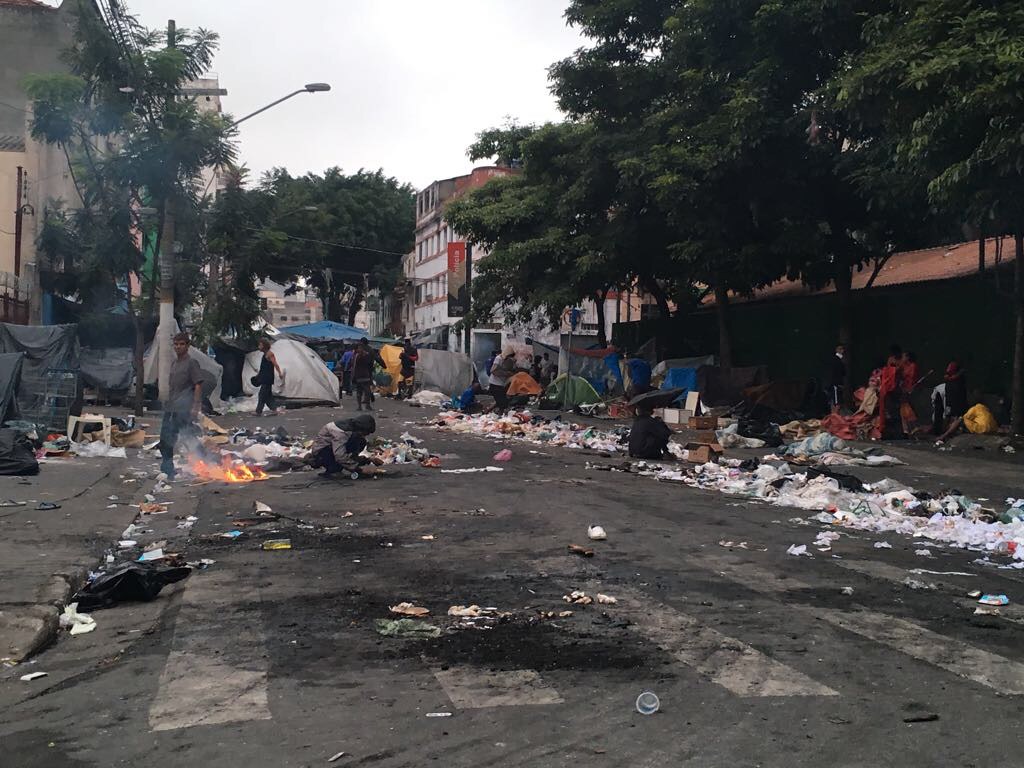On July 28th, São Paulo Mayor, Ricardo Nunes, declared the interdiction of tents and barracks in the region informally known as Cracolândia. Cracolândia is an area between Santa Ifigênia and Campos Elíseos neighbourhoods, in São Paulo’s Central Region, where approximately 1.600 people purchase and consume crack daily triggering the apparition of other petty crimes, since the mid-1990s.
Ricard Nunes based the measure on police intelligence that revealed that the open-air drug market is now an itinerant fair that circulates in the region.
The situation has again raised the very complex and controversial issue of how to fight drug abuse. The subject bumps into the rulers and society’s personal conception about human rights, public health, violence, and others, often causing dissonances between different institutions that undermine public policies trying to address the problem.
THE SOCIAL ISSUE WITH OPEN-AIR DRUG MARKETS
The abuse of drugs is problematic because it generates other crimes committed by chemical dependents, violent acts due to their altered state of consciousness and thefts due to their need to obtain money to purchase products. According to the Federal University of São Paulo (UNIFESP), as many as 46% of people in Cracolândia buy drugs with what they get from robberies. In addition, drugs addicts represent a cheap labour force easily exploited by drug dealers who use them to take law enforcement officers away from Cracolândia.
Drug abuse is also a public health issue that costs a lot of money to public coffers, by the burdens of caring for dependencies and other diseases due to poor hygiene conditions and malnutrition.
The real estate market and retail commerce are also greatly affected due to the flight of customers and inhabitants.
HOW IT HAS BEEN DEAL WITH
If there is the unanimous acceptance that open-air drug markets are a problem, when it comes to solutions, the debate goes in different directions. One example of this is the compulsory hospitalization of drug users. While some say that it is required to revitalize the area and to recover the addict’s health, others invoke personal liberties and say that the users have the right to deny the hospitalization and to freely roam wherever they want to.
For almost 20 years, governments of every political hue in São Paulo tried to deal with Cracolândia. None had a lasting result, considering that the problem still exists and has pulverized drug addicts to other regions, creating open-air drug markets in other cities, also known as “cracolândias”.
Since 2017, when João Dória took office as mayor, passing through the late Bruno Covas mandate, until the current mayor, Ricardo Nunes, the City Hall approach has followed a similar line, with constant cleanup operations, arrests, and attempts to take the region back.
PRIMEIRO COMANDO DA CAPITAL (PCC) INVOLVMENT
Those who think that this whirlwind of substance abuse, drug trade, and criminal violence happens chaotically and randomly are mistaken; the organised crime, represented by the Primeiro Comando da Capital (PCC), has taken the region long ago and turned it into an asset. According to Universidade Federal de São Paulo (UFESP), drug trafficking in the region moves almost R$10 million every month.
São Paulo State Civil Police (PCESP) revealed that Primeiro Comando da Capital (PCC) criminal organisation has a new strategy to sell drugs, using an itinerant fair of tents, drug traffickers and transports. The strategy was called by the media as “Crack Carrousel”. The new dynamic was a response to the City Hall’s attempt to occupy Cracolândia by carrying out at least three cleaning operations every day.
According to the police, the tents (or “stores”) are grouped in blocks, that move in as the cleaning operation advances through the day. Although the dynamics of the “crack carousel” is new, there are similarities to the old model used in Cracolândia in the past. The fair is not limited to drug trafficking; PCC also buys and sells stolen products. Cell phones, bicycles, clothes, copper wire, and even documents to be used in scams are commercialized in the fair.
RECOMMENDATIONS
The huge social and health damages caused by open-air drug markets or cracolândias is far from being solved, as public policies do not seem to be efficient to erase the problem moreover as it expands in cities like Rio de Janeiro (near Avenida Brasil, in the city’s North Zone), Salvador (Rio Vermelho Region), Belo Horizonte (Northwest Region), Porto Alegre (North Zone) and others.
People and especially foreigners should avoid circulating within and nearby cracolândias at any time. In addition, police actions are frequent in these regions and usually lead to disorder, violence and sometimes riots.



